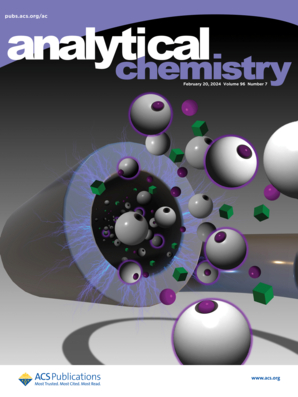基于语音去噪的法拉第电流与非法拉第电流的人工智能识别
IF 6.7
1区 化学
Q1 CHEMISTRY, ANALYTICAL
引用次数: 0
摘要
循环伏安法(CV)已经成为一项强大的技术,可以为电化学系统提供有影响力的见解,包括反应机理,动力学,扩散系数等,在各个研究领域,特别是能量存储和能量转换。然而,如何区分电流值的法拉第电流分量和非法拉第电流分量来提取有用的信息仍然是研究人员面临的一个主要问题。在此,我们报告了一种受语音去噪启发的深度学习算法,该算法利用理论法拉第电流作为研究目标,并从循环伏安图的总体电流响应中预测它。该深度神经网络(DNN)由一系列完全连接的层构成,这些层将权重矩阵应用于输入,并使用激活函数对其进行变换以获得所需的回归。我们的模型表现良好,理论法拉第电流与总电流的预测响应之间的总体平均绝对百分比误差(mape)为6.36%,阳极峰的峰值位置差为2.56 mV,阴极峰的峰值位置差为2.44 mV。此外,该算法还能够以3.37%的MAPE和最小的峰值位置误差(小于0.75 mV)从实验数据中提取峰值电流。这种创新的方法可以作为一种工具来帮助研究人员研究电化学系统使用CV。本文章由计算机程序翻译,如有差异,请以英文原文为准。

AI-Based Discrimination of Faradaic Current against Nonfaradaic Current Inspired by Speech Denoising
Cyclic voltammetry (CV) has been a powerful technique to provide impactful insights for electrochemical systems, including reaction mechanism, kinetics, diffusion coefficients, etc., in various fields of study, notably energy storage and energy conversion. However, the separation between the faradaic current component of CV and the nonfaradaic current contribution to extract useful information remains a major issue for researchers. Herein, we report a deep learning algorithm inspired by speech denoising that utilizes the theoretical faradaic current as a study target and predicts it from the overall current response from cyclic voltammograms. This deep neural network (DNN) is constructed from a series of fully connected layers, which apply a weight matrix to the inputs and transform it using an activation function to obtain the desired regression. Our model performed well with overall mean absolute percentage errors (MAPEs) of 6.36% between theoretical faradaic currents and the predicted responses from the total currents, with a peak position difference of 2.56 mV for anodic peaks and 2.44 mV for cathodic ones. Furthermore, the algorithm is also capable of extracting peak current values from experimental data with 3.37% MAPE and minimal peak position error (less than 0.75 mV). This innovative approach may be used as a tool to assist researchers in studying electrochemical systems using CV.
求助全文
通过发布文献求助,成功后即可免费获取论文全文。
去求助
来源期刊

Analytical Chemistry
化学-分析化学
CiteScore
12.10
自引率
12.20%
发文量
1949
审稿时长
1.4 months
期刊介绍:
Analytical Chemistry, a peer-reviewed research journal, focuses on disseminating new and original knowledge across all branches of analytical chemistry. Fundamental articles may explore general principles of chemical measurement science and need not directly address existing or potential analytical methodology. They can be entirely theoretical or report experimental results. Contributions may cover various phases of analytical operations, including sampling, bioanalysis, electrochemistry, mass spectrometry, microscale and nanoscale systems, environmental analysis, separations, spectroscopy, chemical reactions and selectivity, instrumentation, imaging, surface analysis, and data processing. Papers discussing known analytical methods should present a significant, original application of the method, a notable improvement, or results on an important analyte.
 求助内容:
求助内容: 应助结果提醒方式:
应助结果提醒方式:


